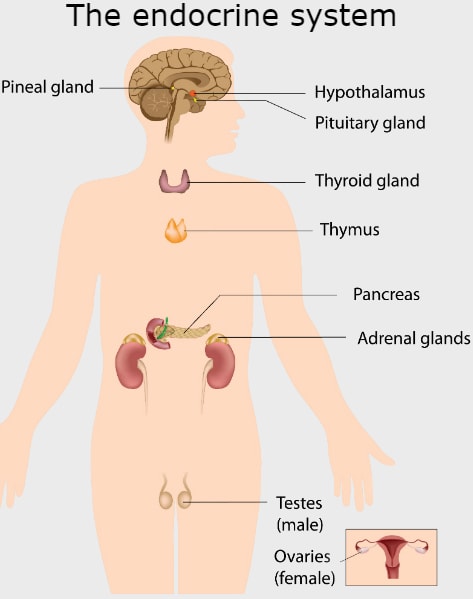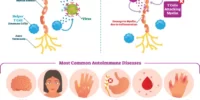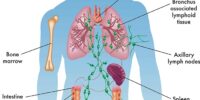What Is The Endocrine System? Hormones And Their Role In The Body

The endocrine system is a complex and vital system in the human body responsible for producing and regulating hormones. Hormones are chemical messengers that travel through the bloodstream to various organs and tissues, controlling a wide range of bodily functions.
The endocrine system works in conjunction with the nervous system to maintain homeostasis, or balance, in the body. The endocrine system consists of a number of glands located throughout the body, each with its own specific function.
These glands release hormones in response to certain signals, such as changes in blood sugar levels or stress. Hormones are then transported to target cells, where they bind to specific receptors and initiate a response.
The endocrine system plays a crucial role in regulating growth and development, metabolism, reproductive function, and stress response, among other functions.
Key Takeaways
- The endocrine system produces and regulates hormones that control bodily functions and maintain homeostasis.
- Hormonal imbalances can cause a variety of symptoms and specific disorders such as thyroid dysfunction, insulin resistance, adrenal insufficiency, and low testosterone levels.
- Diagnosis and treatment involve medical history, physical examination, blood tests, imaging techniques, and specific options such as medications, hormone replacement therapy, surgery, and lifestyle changes such as diet, exercise, stress management, and sleep.
- Maintaining hormonal health requires regular exercise, a well-balanced diet, stress management, adequate sleep, and following lifestyle tips and strategies to prevent endocrine disorders.
The Pituitary Gland: Master of the Endocrine System
The Pituitary gland, located at the base of the brain, controls the secretion of hormones from various glands in the body, acting as the master regulator of the endocrine system. This gland is divided into two parts, the anterior and posterior pituitary, each with specific functions.
The anterior pituitary produces and secretes hormones that control the function of other endocrine glands, such as the thyroid, adrenal, and gonads. The posterior pituitary, on the other hand, stores and releases hormones produced by the hypothalamus, which regulate water balance, blood pressure, and lactation.
The pituitary gland plays a critical role in the body’s growth, metabolism, and reproduction. It produces hormones that stimulate the growth of bones, muscles, and organs, as well as hormones that regulate metabolism and energy balance. Additionally, it produces hormones that control the menstrual cycle, ovulation, and pregnancy.
Disorders of the pituitary gland, such as hypopituitarism or hyperpituitarism, can result in a range of symptoms, including growth abnormalities, infertility, and metabolic disorders. Therefore, understanding the function of the pituitary gland is crucial in diagnosing and treating endocrine disorders.
The Thyroid Gland: Regulating Metabolism and Growth
Regulating metabolism and growth, the thyroid gland plays a crucial role in maintaining overall health and wellbeing. Located in the neck, just below the larynx, this butterfly-shaped gland secretes two important hormones – thyroxine (T4) and triiodothyronine (T3).
These hormones are responsible for regulating metabolism, which is the process of converting food into energy that the body can use. They also play a key role in growth and development, particularly in children and adolescents.
The thyroid gland is regulated by the pituitary gland, which secretes thyroid-stimulating hormone (TSH). When the levels of T4 and T3 in the blood are too low, the pituitary gland releases more TSH, which stimulates the thyroid gland to produce more hormones.
Conversely, when the levels of T4 and T3 are too high, the pituitary gland reduces its production of TSH, which slows down the production of hormones by the thyroid gland.
Disorders of the thyroid gland can result in a range of symptoms, including weight gain or loss, fatigue, and changes in heart rate. Treatment typically involves medication to regulate hormone levels.
The Adrenal Glands: Managing Stress and Energy
Located on top of the kidneys, the adrenal glands play an important role in managing stress and energy levels. These small, triangular-shaped glands consist of two parts – the outer adrenal cortex and the inner adrenal medulla, each producing different hormones.
The adrenal cortex, responsible for producing hormones such as cortisol, aldosterone, and androgens, helps regulate metabolism, immune response, and blood pressure. The adrenal medulla produces adrenaline and noradrenaline, which are responsible for the body’s ‘fight or flight’ response to stress.
The adrenal gland’s primary role is to help the body cope with stress, whether physical or emotional. When the body perceives a threat, the adrenal glands release adrenaline and noradrenaline, which cause an increase in heart rate, breathing rate, and blood pressure. These hormones also cause the release of glucose from the liver, providing the body with extra energy to deal with the stressor.
Cortisol, also produced by the adrenal glands, is a stress hormone that helps regulate the body’s response to stress over a longer period. It helps increase blood sugar levels, suppress the immune system, and regulate the body’s metabolism during times of stress.
Overall, the adrenal glands play a crucial role in managing the body’s response to stress and regulating energy levels to help maintain homeostasis.
The Pancreas: Controlling Blood Sugar and Digestion
Situated near the stomach and small intestine, the pancreas plays a vital role in controlling blood sugar levels and aiding in the digestion of food. Here are four key functions of the pancreas:
- Producing digestive enzymes: The pancreas produces and secretes digestive enzymes that help break down carbohydrates, proteins, and fats in the small intestine.
- Secreting hormones: The pancreas also secretes hormones, such as insulin and glucagon, that regulate blood sugar levels. Insulin helps lower blood sugar levels, while glucagon raises them.
- Storing enzymes: The pancreas stores digestive enzymes in an inactive form until they are needed for digestion.
- Protecting itself: The pancreas has a layer of protective tissue that helps shield it from digestive enzymes. Without this protection, the enzymes could damage the pancreas and lead to pancreatitis.
The pancreas is an essential organ that performs multiple functions to ensure the body maintains a healthy balance. Its ability to control blood sugar levels and aid in digestion is vital for overall health and well-being.
The Reproductive Glands: Essential for Fertility and Sexual Development
The reproductive glands, responsible for fertility and sexual development, are critical organs in the human body. These glands, also known as the gonads, include the testes in males and the ovaries in females. They are responsible for producing and releasing hormones that regulate the reproductive system.
In males, the testes produce testosterone, which is responsible for the development of male sex organs and secondary sexual characteristics such as facial hair and a deeper voice. In females, the ovaries produce estrogen and progesterone, which are responsible for the development of female sex organs and secondary sexual characteristics such as breast growth and the onset of menstruation.
In addition to their role in sexual development, the reproductive glands also play a critical role in fertility. The testes produce sperm, which can fertilize a female’s egg, resulting in pregnancy. The ovaries release one egg each month during ovulation, which can also be fertilized by sperm. If fertilization occurs, the fertilized egg travels to the uterus and implants, resulting in pregnancy.
The reproductive glands play a crucial role in maintaining a healthy and functioning reproductive system, which is essential for the continuation of the human species.
Hormonal Imbalances: Common Disorders and Symptoms
Hormonal imbalances are common disorders that can result in a variety of symptoms affecting different parts of the body. These imbalances can occur when there is too much or too little of a particular hormone in the bloodstream. They can affect both men and women and can occur at any age.
One of the most common hormonal imbalances is thyroid dysfunction. The thyroid gland produces hormones that regulate the body’s metabolism. When the thyroid gland produces too much or too little hormone, it can cause symptoms such as weight gain or loss, fatigue, depression, and irregular menstrual cycles.
Another common hormonal imbalance is insulin resistance, which can lead to type 2 diabetes. Insulin is a hormone that helps regulate blood sugar levels. When cells become resistant to insulin, the body has trouble regulating blood sugar levels, which can lead to a host of health problems.
Other hormonal imbalances include adrenal insufficiency, which can cause fatigue and weakness, and low testosterone levels, which can cause decreased sex drive, muscle loss, and fatigue.
Causes of hormonal imbalances:
- Genetics
- Chronic stress
Ways to manage hormonal imbalances:
- Hormone replacement therapy
- Medications
- Lifestyle changes such as diet and exercise.
Diagnosis and Treatment of Endocrine Disorders
Diagnosis and treatment of disorders related to the endocrine system require specialized medical expertise and a range of diagnostic tools to accurately identify the underlying cause of hormonal imbalances.
Diagnosis of endocrine disorders usually begins with a thorough medical history and physical examination, followed by a series of blood tests to measure hormone levels.
Other imaging techniques, such as ultrasound, magnetic resonance imaging (MRI), and computed tomography (CT) scans, may also be used to visualize the endocrine glands and detect any abnormalities.
Once the diagnosis is confirmed, treatment options will depend on the specific disorder and its severity.
Treatment may involve medications, hormone replacement therapy, or surgery to remove a tumor or repair a damaged gland.
In some cases, lifestyle changes, such as diet and exercise, may also be recommended to help manage symptoms and improve hormonal balance.
It is important to work closely with a healthcare professional and follow their recommended treatment plan to effectively manage endocrine disorders and prevent complications.
Maintaining Hormonal Health: Lifestyle Tips and Strategies
Maintaining a healthy lifestyle can positively impact the functioning of the endocrine system and help regulate hormone levels. Here are some tips and strategies that can help maintain hormonal health:
- Regular exercise: Exercise can improve insulin sensitivity, lower stress hormones, and increase the production of hormones that promote feelings of well-being.
- Balanced diet: A well-balanced diet with adequate protein, healthy fats, and complex carbohydrates can help regulate blood sugar levels, reduce inflammation, and support hormone production.
- Stress management: Chronic stress can disrupt hormone balance, so it’s important to find ways to manage stress. This can include practices such as meditation, yoga, or therapy.
- Adequate sleep: Sleep is crucial for hormone regulation, and lack of sleep can disrupt hormone production. Aim for at least 7-8 hours of sleep per night to support hormonal health.
By following these lifestyle tips and strategies, individuals can maintain hormonal health and prevent the development of endocrine disorders. It’s important to remember that small changes can have a big impact on the functioning of the endocrine system and overall health.
Conclusion
In conclusion, the endocrine system plays a crucial role in maintaining various bodily functions through the secretion of hormones.
Each gland has its unique function, and a disruption in the normal functioning of any gland can lead to hormonal imbalances and disorders.
It is important to recognize the symptoms of hormonal disorders and seek medical attention promptly.
Proper diagnosis and treatment can help manage the condition and improve overall health.
Additionally, adopting a healthy lifestyle by maintaining a balanced diet, exercising regularly, and managing stress can help maintain hormonal health.
A better understanding of the endocrine system and its functioning can help individuals take proactive steps towards maintaining a healthy life.









